For the 4th of July, veterans and Greyshirts share their thoughts on service to country—then and now.
Mahlon Manson
Mahlon Manson enlisted in August of 1967, choosing the Army because his father had spent 26 years Navy and he thought he should do something different. Manson spent a year in Vietnam and left with the Bronze Star Medal with Valor and a Purple Heart award. When he rotated back to the States he was assigned to Fort Devens, went to chemical school, and spent a lot of time at Camp Drum as operations sergeant of the temporary duty engineer detachment from Fort Devens.
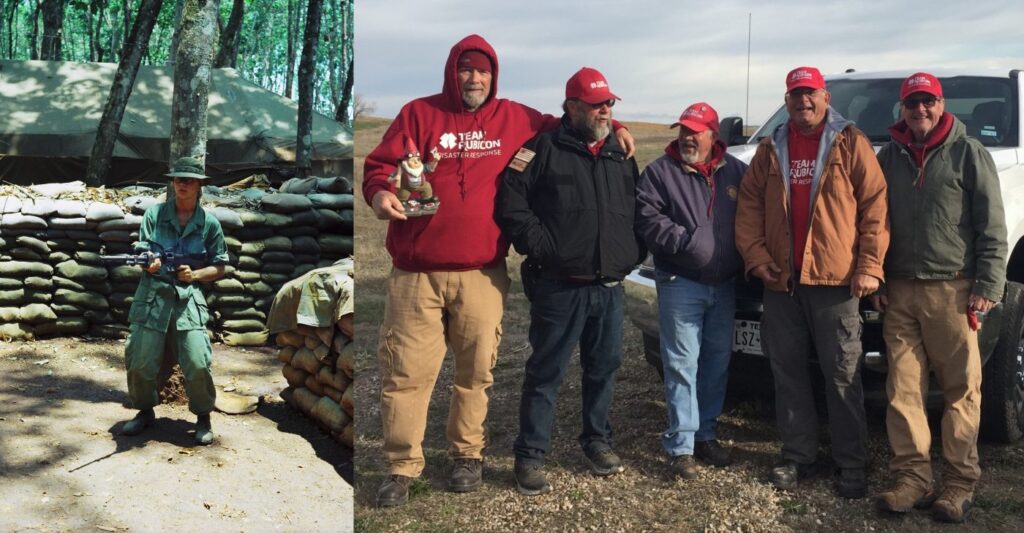
Today, Manson incorporates service to country in every aspect of his life: He has served on the school board, is a former EMS responder and firefighter, served on his Fire District Board—where he ended up as board chairman—and currently works with Disaster and Emergency Services and the Local Emergency Planning Committee in Missoula County, Montana.
He’s also a Team Rubicon Greyshirt who has deployed on 16 operations since joining in 2015. Manson joined because he likes “the company of other veterans, who always have your back,” he confesses.
“While I was in Vietnam, service meant doing the best you could with what you had, watching out for your buddies,” says Manson. “It is like TR today, I guess that is why I was attracted to this organization in the first place.”
TR: Going into the 4th of July, what does independence mean to you now?
Manson: To me the 4th of July is a time of reflection, I know that freedom comes with some responsibility, the most basic is to vote.
Read Manson’s reflection “Finding the Tribe That Always Has Your Back.”
Marcela Monahan
Marcela Monahan is a Marine who served for 31 years on active duty and the reserves and was mobilized six times. She served in Iraq from January of 2009 to January of ’10 as a colonel at the time and as the G-7 Assistant Chief of Staff Engineers for Multi-National Forces–West in Al Anbar, Iraq. She retired as a Brigadier General in 2014. A Greyshirt who first deployed to Operation Amberjack in 2018, she spent much of her time during the coronavirus pandemic volunteering with Team Rubicon at Virginia foodbanks.
A first-generation American—her parents were from Chile—Monahan says she experienced firsthand the true privilege and pride of being an American.
“I wanted to serve my country as it had served me and my whole family,” she says. She calls the Marine Corps her home; she first announced her intention to become one while living in England when “The President’s Own” was in concert at the Royal Albert Hall in London. “I was in fifth grade and during a break, I remember going up to one of the Marines and telling him I was going to be a Marine one day, and I meant it.”
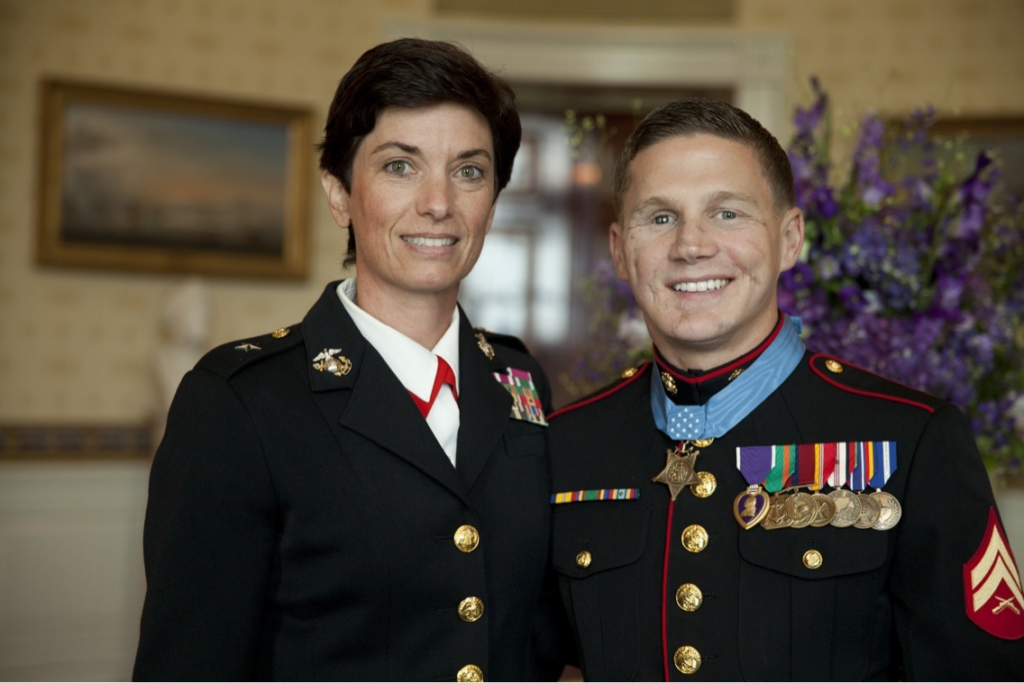
After retiring from the Marine Corps in 2014, Monahan continued the quest of defining her mission in life. At its core is service to others and maximizing the survival and mission success for our Marines.
“The importance of service-to-country and service-to-others should be constant regardless of situation or opportunity,” says the retired Marine. “Everything—even personal success—is maximized by service to others.”
Underpinning her commitment to service are her beliefs in honor, courage, and commitment, too. As she said in a speech at a Marine Corps Law Enforcement Foundation dinner: “You may not be raising the flag on Suribachi or storming Fallujah, but never ever underestimate the power, or the message, or the lasting effect, of even seemingly insignificant or unnoticed honor, courage and commitment. It penetrates. It changes. It grows. And in the end, you will in fact never know its true reach and influence.”
TR: Going into the 4th of July, what does independence mean to you now?
Monahan: I believe independence should be “responsible freedom” that focuses on others rather than self. Independence should relieve rather than burden others. It does not mean that independence does not require support, but the focus should not be self-centered and in fact should be empowering beyond self.
Bob Pries
Vietnam veteran Bob Pries enlisted in the U.S. Army at a time when it was unpopular to do so in America. He was proud to serve.
His three years of active duty included two tours in Vietnam as a Combat Medic with the Infantry. “It was the worst of times, but also the best of times,” says Pries. “The men I served with are some of the best people I have ever met.”
For Pries, service during the Vietnam war wasn’t about the country or the American flag. To him, it meant taking care of his brothers and doing all he could—at whatever cost personally—to see that they all came home safely. It didn’t always work out as they hoped, he says, but they did their best.
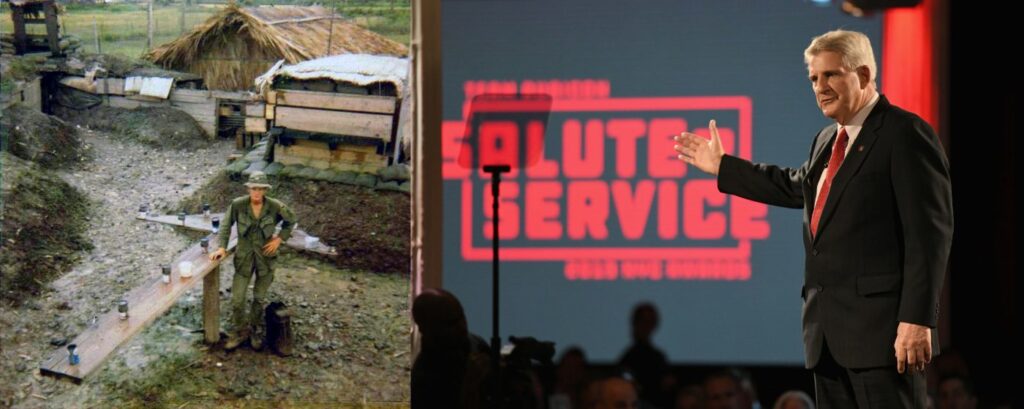
Service remains extremely important to Pries to this day. He continues to serve some of the Brothers he served with in Vietnam, keeping in contact with them and bringing them to The Wall—the Vietnam Veterans Memorial—in D.C., which is to him a place of healing. And, he’s a longstanding Greyshirt.
“I serve with Team Rubicon in whatever capacity I am able, by helping others on the worst days of their lives; by interacting with and coaching younger veterans who often feel they are the only ones who are experiencing the after-effects of military service and may benefit from my experiences; by being on a team where veterans and civilians work side-by-side on a shared mission, helping to create understanding and relationships across the so-called “civilian-military divide,” and by helping drive our culture based on service and getting shit done,” Pries explains.
TR: Going into the 4th of July, what does independence mean to you now?
Pries: To me, it is a day to celebrate the birth of our nation and to reflect on all we have accomplished over the past 248 years. It is also a day to think about all that we need to do to continue to move our nation forward to live up to the ideals set forth in our Constitution. We have come a long way, but we still have a long way to go to ensure that every American is treated equitably and equally.
John Ruehle
As a young man growing up in the ’60s, John Ruehle wrestled with some of the same issues many young people did at the time: What was he going to do with his life? What was really important to him, and what were his priorities? So, he decided to go to college. Then, in the summer of ’68, he and a friend decided they would quit college, join the Marines, and serve their country. They felt it was their obligation as citizens, and that they needed to do their part.
The Marine Corps turned out to be everything he had hoped for, and then some. In boot camp, he was just one of four enlistees out of platoon of 80-plus. The vast majority of the rest were there not by choice, says Ruehle. “It made for an interesting melting pot.”
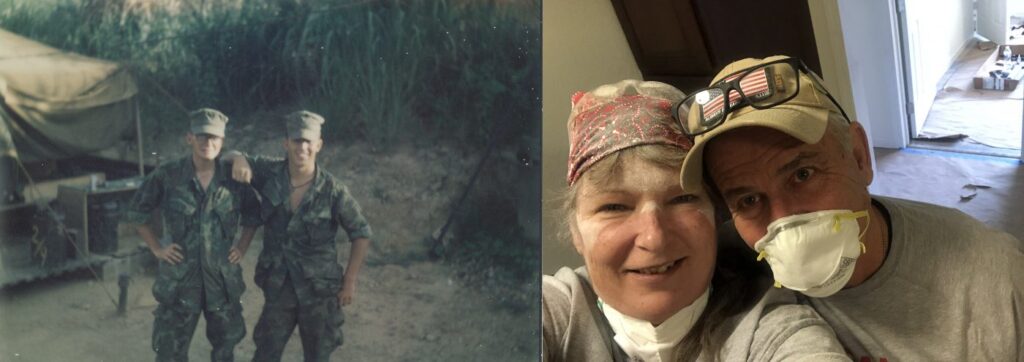
Throughout his training, Ruehle learned to depend on others, something he wasn’t accustomed to. “Considering myself an independent cuss, this concept was quite difficult to grasp. But once bitten, it develops a feeling of camaraderie that lasts a lifetime.”
For Ruehle and his colleagues, the bond of being Marines never went away. And while it was proven out on many occasions, that bonded feeling was driven home the night he was wounded.
“It was a nighttime attack and bullets and explosions were coming from every direction. My partner was trying to navigate with me to an aid station and a young Marine grabbed us and pulled us into his hole for some protection. It was not big enough for the three of us so he climbed out and laid across the edge of the hole, offering us more protection while seriously exposing himself,” explains Ruehle. “I was evacuated to a hospital ship that next morning and never had a chance to properly thank him or get his name. That is my only regret of the war.”
After Ruehle returned to the states he married, started a family, and began volunteering with the Cub Scouts and the Boy Scouts, as well as with several community agencies. After his children were grown and gone, he volunteered with the Forest Service—work he still does to this day.
And then, he discovered Team Rubicon, and took service-to-country to new levels.
“Everything I have been trying to accomplish has seemed to come together in one organization: Volunteer work that can actually make a difference. The camaraderie of shared experiences and desire to serve. Respect for flag, country and individuals. All that which I have sought, from various channels throughout my career, I have found in one organization—Team Rubicon,” says Ruehle.
TR: Going into the 4th of July, what does independence mean to you now?
Ruehle: For me, independence today means the ability to operate freely within the protective cloak of our Nation. To obey and play within the guidelines set forth to enable a diversified nation of individuals to pursue their dreams while not inhibiting others from theirs.
Read Ruehle’s reflection: “A Vietnam Veteran Reflects on Service, Then and Now.”
Jake Wood
Team Rubicon Cofounder and Executive Chairman of the Board, Jake Wood, was a sergeant in the United States Marine Corps, deployed to Iraq and Afghanistan as a Scout Sniper, and earned the Navy-Marine Commendation Medal. Initially, he spent four years of the wars in Iraq and Afghanistan watching from the comfort of his apartment in college as young men and women went off to war. As the casualty counts mounted he felt the urge to do his part.
“When I enlisted in 2005 I think I viewed ‘service’ as ‘doing my part.’ Our country was deep into both wars by then, and the illusion of WMDs was already gone in Iraq and the Taliban was already toppled in Afghanistan. So, the decision was less about the imminence of protecting America as it was about shouldering the burden of the fight alongside the Americans already fighting it,” says Wood. “I’m a big believer that our democracy will only sustain if everyone is willing to do their part.”
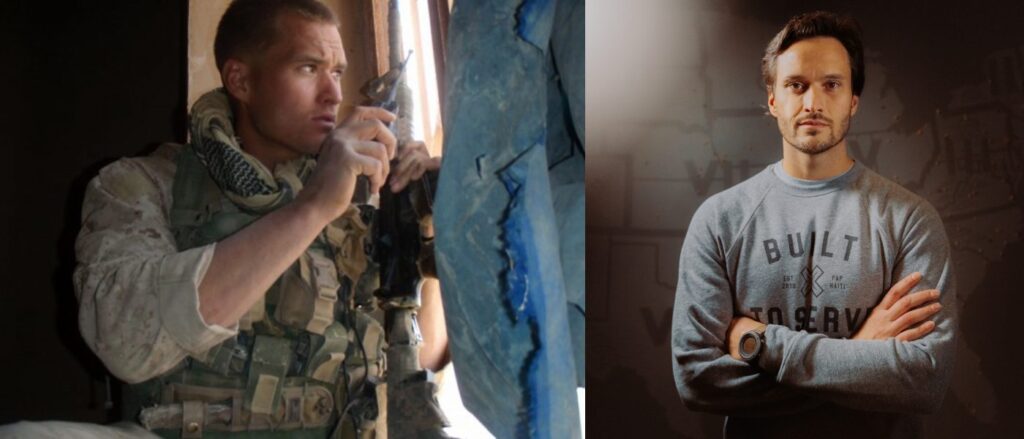
Wood’s take on service has changed slightly over the years, but mostly in its importance: service to country may be even more important to him today than when he was serving in the Middle East.
“The fabric of our country is fraying at its seams. We’re divided, our policies are failing, and our children are looking at a future where—for the first time in our history—they’ll be worse off than the generation that preceded them. Nothing characterizes this better than the public’s general sentiment, which has become, ‘What’s in it for me?’ rather than ‘What’s in it for us?’ We’ve lost the ability to govern for the collective good. Why? I believe it’s because we no longer understand one another. We don’t understand one another because we don’t bother to experience on another’s hardships.”
What restores those things? Service, he says. “Service puts others first. It exposes us to new and different perspectives. It allows us to have empathy. Imagine if we could get back to a place where that was the norm.”
TR: Going into the 4th of July, what does Independence mean to you now?
Wood: I think it will be hard to celebrate this Independence Day without reflecting on current events. I’ve long known that “my” America is different than some other peoples’ America. My America has always been good to me. It has provided me safety, health, education, and an opportunity. America always delivered on its promise to me. Not everyone is so lucky.
My growing awareness of Juneteenth, which celebrates the independence of African-American slaves, recently drove this home for me. Our Founding Fathers laid the groundwork for the world’s greatest experiment in liberty and governance, but it was not perfect, and it did not live up to its founding tenet: that all men are created equal. While I’m still proud of America, I’ll spend some time this weekend reflecting on all the work this nation has left to do.
Elias “Sam” Yeagley
Immediately after graduating high school in 1958, Elias “Sam” Yeagley enlisted with the U.S. Navy. He was 17, and he had always wanted to serve in the military, just as his older brother was doing in the Army. Yeagley joined because he wanted to; he stayed because he enjoyed what he was doing. It was the height of the Cold War and Yeagley, who started off loading missiles onto submarines and went on to become a nuclear weapons mechanic, felt he was aiding in U.S. efforts.
Even after Yeagley left the service in ’79, he continued to serve, but this time as a volunteer. He was the Emergency Manager for Naval Air Station North Island for 13 year, an EMT for 26 years, and taught EMT classes for 20 years. He’s been with his local sheriff’s department for more than 40 years, first working in search and rescue, then becoming a reserve deputy. Today, he volunteers with his local sheriff’s office in emergency communications. He is also a longstanding Greyshirt, having served since 2013 and is an Instructor One.
TR: Going into the 4th of July, what does Independence mean to you now?
Yeagley: That even though I’m getting old I can still volunteer, and it still means something both to me and the people I’m volunteering with. I have the experience, and the fact I can still volunteer—that I have the freedom to do it, and the independence to do it on my own, and that I don’t have to be told I have to do it is the essence of independence for me.



